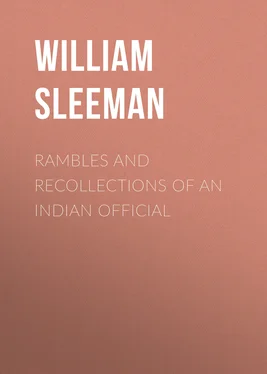William Sleeman - Rambles and Recollections of an Indian Official
Здесь есть возможность читать онлайн «William Sleeman - Rambles and Recollections of an Indian Official» — ознакомительный отрывок электронной книги совершенно бесплатно, а после прочтения отрывка купить полную версию. В некоторых случаях можно слушать аудио, скачать через торрент в формате fb2 и присутствует краткое содержание. Жанр: Путешествия и география, История, foreign_edu, foreign_antique, foreign_prose, на английском языке. Описание произведения, (предисловие) а так же отзывы посетителей доступны на портале библиотеки ЛибКат.
- Название:Rambles and Recollections of an Indian Official
- Автор:
- Жанр:
- Год:неизвестен
- ISBN:нет данных
- Рейтинг книги:4 / 5. Голосов: 1
-
Избранное:Добавить в избранное
- Отзывы:
-
Ваша оценка:
- 80
- 1
- 2
- 3
- 4
- 5
Rambles and Recollections of an Indian Official: краткое содержание, описание и аннотация
Предлагаем к чтению аннотацию, описание, краткое содержание или предисловие (зависит от того, что написал сам автор книги «Rambles and Recollections of an Indian Official»). Если вы не нашли необходимую информацию о книге — напишите в комментариях, мы постараемся отыскать её.
Rambles and Recollections of an Indian Official — читать онлайн ознакомительный отрывок
Ниже представлен текст книги, разбитый по страницам. Система сохранения места последней прочитанной страницы, позволяет с удобством читать онлайн бесплатно книгу «Rambles and Recollections of an Indian Official», без необходимости каждый раз заново искать на чём Вы остановились. Поставьте закладку, и сможете в любой момент перейти на страницу, на которой закончили чтение.
Интервал:
Закладка:
The work was completed in June, 1830; and I have several times seen upon the bridge as many as it could hold of a regiment of infantry while it moved over; and, at other times, as many of a corps of cavalry, and often several elephants at once. The bridge is between the points of suspension two hundred feet, and the clear portion of the platform measures one hundred and ninety feet by eleven and a half. The whole cost of the work amounted to about fifty thousand rupees; and, under a less able and careful person than Colonel Presgrave, would have cost, perhaps, double the amount. This work has been declared by a very competent judge to be equal to any structure of the same kind in Europe, and is eminently calculated to show what genius and perseverance can produce out of the resources of a country even in the rudest state of industry and the arts.
The river Nerbudda neither is nor ever can, I fear, be made navigable, and the produce of its valley would require to find its way to distant markets over the Vindhya range of hills to the north, or the Sātpura to the south. If the produce of the soil, mines, and industry of the valley cannot be transported to distant markets, the Government cannot possibly find in it any available net surplus revenue in money; for it has no mines of the precious metals, and the precious metals can flow in only in exchange for the produce of the land, and the industry of the valley that flows out. If the Government wishes to draw a net surplus revenue from the valley or from the districts that border upon it, that is, a revenue beyond its expenditure in support of the local public establishments, it must either draw it in produce, or for what can be got for that produce in distant markets. 189Hitherto little beyond the rude produce of the soil has been able to find its way into distant markets from the valley of the Nerbudda; yet this valley abounds in iron mines, 190and its soil, where unexhausted by cropping, is of the richest quality. 191It is not then too much to hope that in time the iron of the mines will be worked with machinery for manufactures; and that multitudes, aided by this machinery, and subsisted on the rude agricultural produce, which now flows out, will invest the value of their labour in manufactured commodities adapted to the demand of foreign markets and better able from their superior value, compared with their bulk, to pay the cost of transport by land. Then, and not till then, can we expect to see these territories pay a considerable net surplus revenue to Government, and abound in a middle class of merchants, manufacturers, and agricultural capitalists. 192
At Sanodā there is a very beautiful little fortress or castle now unoccupied, though still entire. It was built by an officer of the Rājā Chhatar Sāl of Bundēlkhand, about one hundred and twenty years ago. 193He had a grant, on the tenure of military service, of twelve villages situated round this place; and a man who could build such a castle to defend the surrounding country from the inroads of freebooters, and to secure himself and his troops from any sudden impulse of the people's resentment, was as likely to acquire an increase of territorial possession in these parts as he would have been in Europe during the Middle Ages. The son of this chief, by name Rāi Singh, was, soon after the castle had been completed, killed in an attack upon a town near Chitrakōt; 194and having, in the estimation of the people, become a god , he had a temple and a tomb raised to him close to our encampment. I asked the people how he had become a god ; and was told that some one who had been long suffering from a quartan ague went to the tomb one night, and promised Rāi Singh, whose ashes lay under it, that if he could contrive to cure his ague for him, he would, during the rest of his life, make offerings to his shrine. After that he had never another attack, and was very punctual in his offerings. Others followed his example, and with like success, till Rāi Singh was recognized among them universally as a god, and a temple raised to his name. This is the way that gods were made all over the world at one time, and are still made all over India. Happy had it been for mankind if those only who were supposed to do good had been deified. 195
On the 2nd we came on to the village of Khojanpur (leaving the town and cantonments of Sāgar to our left), a distance of some fourteen miles. The road for a great part of the way was over the bare back of the sandstone strata, the covering of basalt having been washed off. The hills, however, are, at this distance from the city and cantonments of Sāgar, nicely wooded; and, being constantly intersected by pretty little valleys, the country we came over was picturesque and beautiful. The soil of all these valleys is rich from the detritus of the basalt that forms or caps the hills; but it is now in a bad state of cultivation, partly from several successive seasons of great calamity, under which the people have been suffering, and partly from over-assessment; and this posture of affairs is continued by that loss of energy, industry, and character, among the farmers and cultivators, which must everywhere result from these two evils. In India, where the people have learnt so well to govern themselves, from the want of settled government, good or bad government really depends almost altogether upon good or bad settlements of the land revenue . Where the Government demand is imposed with moderation, and enforced with justice, there will the people be generally found happy and contented, and disposed to perform their duties to each other and to the state; except when they have the misfortune to suffer from drought, blight, and other calamities of season. 196
I have mentioned that the basalt in the Sāgar district reposes for the most part immediately upon the sandstone of the Vindhya range; and it must have been deposited on the sand, while the latter was yet at the bottom of the ocean, though this range is now, I believe, nowhere less than from fifteen hundred to two thousand feet above the level of the sea. The marks of the ripple of the sea may be observed in some places where the basalt has been recently washed off, beautifully defined, as if formed only yesterday, and there is no other substance to be seen between the two rocks.
The texture of the sandstone at the surface, where it comes in contact with the basalt, has in some places been altered by it, but in others it seems to have been as little changed as the habitations of the people who were suffocated by the ashes of Vesuvius in the city of Pompeii. I am satisfied, from long and careful examination, that the greater part of this basalt, which covers the tableland of Central and Southern India, must have been held for some time in suspension in the ocean or lake into which it was first thrown in the shape of ashes, and then gradually deposited. This alone can account for its frequent appearance of stratification, for the gentle blending of its particles with those of the sand near the surface of the latter; and, above all, for those level steps, or tables, lying one above another horizontally in parallel bars on one range, corresponding exactly with the same parallel lines one above another on a range twenty or thirty miles across the valley. Mr. Scrope's theory is, I believe, that these are all mere flowing coulées of lava, which, in their liquid state, filled hollows, but afterwards became of a harder texture, as they dried and crystallized, than the higher rocks around them; the consequence of which is that the latter has been decomposed and washed away, while the basalt has been left to form the highest elevations. My opinion is that these steps, or stairs, at one time formed the beds of the ocean, or of great lakes, and that the substance of which they are composed was, for the most part, projected into the water, and there held in suspension till gradually deposited. There are, however, amidst these steps, and beneath them, masses of more compact and crystalline basalt, that bear evident signs of having been flows of lava. 197
Читать дальшеИнтервал:
Закладка:
Похожие книги на «Rambles and Recollections of an Indian Official»
Представляем Вашему вниманию похожие книги на «Rambles and Recollections of an Indian Official» списком для выбора. Мы отобрали схожую по названию и смыслу литературу в надежде предоставить читателям больше вариантов отыскать новые, интересные, ещё непрочитанные произведения.
Обсуждение, отзывы о книге «Rambles and Recollections of an Indian Official» и просто собственные мнения читателей. Оставьте ваши комментарии, напишите, что Вы думаете о произведении, его смысле или главных героях. Укажите что конкретно понравилось, а что нет, и почему Вы так считаете.












